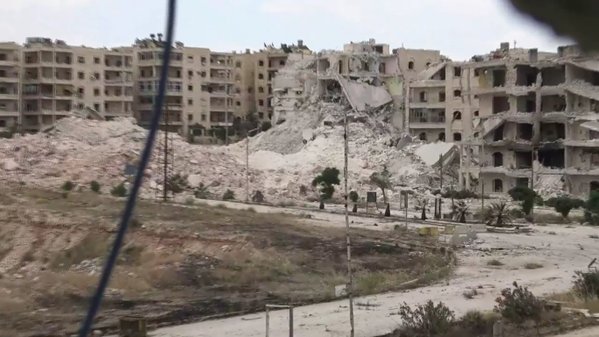
In a message on Thursday addressed to Vladimir Putin felicitating Russia on its Victory Day, Syrian President Bashar Al-Assad compared the fighting around the city of Aleppo to Stalingrad, which turned the tide of World War II. It’s a powerful metaphor for the Russian psyche, driving home that winning the Syrian war in Aleppo’s battle fields is a must and there is no scope for compromise.
Assad sent his message on the same day the US-Russia agreement extending the Syrian truce to the Aleppo theatre came into effect. Damascus insists this is only a 48-hour cease fire. Indeed, the Iranian reports on Thursday highlighted that the Syrian army and Hezbollah fighters “backed up by the country’s fighter jets and Russian artillery units” continue their operations in western Aleppo, pushing back the extremist fighters.
On the other hand, Washington is anxious to interpret that the agreement with Moscow means that Aleppo falls within the purview of the ceasefire across the country. But is the ceasefire possible in a situation where the extremist groups (who have been excluded from the ceasefire) freely intermingle with the so-called moderate opposition groups? The Kremlin spokesman Dmitry Peskov acknowledged on Thursday the difficulties:
You always want to hope for the better: this is what is desired by the Russian side and, probably, by our American colleagues. At the same time, there are such complicated mixtures of terrorists and representatives of the opposition [in Aleppo] that, of course, the situation is potentially very fragile.
Besides, Washington’s motives in coaxing Moscow into the ceasefire agreement over Aleppo are also in some doubt. Soon after the ceasefire in Aleppo began at 1.00 am local time, the US government-funded Voice of America blasted the Kremlin for its “cynical” policy on Syria that aims at Russia being the “co-equal” with the US:
Russia’s Syria campaign was also widely viewed as a cynical move by the Kremlin to get back on the world stage after more than a year of pariah status in the West over its annexation of Ukraine’s Crimean peninsula and military aggression… But while Russia maintains considerable sway over Damascus, it is not clear how much leverage Moscow is willing to use to halt Assad’s ambition to conquer the (Aleppo) city and re-take all of Syria.
Clearly, Assad’s message to Putin (which was released in Damascus) is also addressed to Washington. Tehran has not voiced any opinion so far on the US-Russia agreement on Aleppo, but the extended meeting between the influential Iranian statesman Ali Akbar Velayati with Hezbollah leader Hassan Nasrallah in Beirut on Thursday is a suggestive move.
What is Washington’s game plan? The fact of the matter is that the Obama administration’s Syria policies are at a dead end, and the Secretary of State John Kerry is probably buying time for the presidency. A dispatch by Wall Street Journal, here, reveals the complete policy breakdown:
The fate of Syria’s moderate rebels is critical to American efforts… If rebels quit the fight or join forces with Islamist extremist groups fighting the regime, the US will lose leverage to shape the war’s outcome—and potential allies against Islamic State. Some rebel commanders close to the US warn that the diplomatic deadlock and renewed airstrikes against rebel-held areas would push people into the arms of the extremists, including Nusra Front, an al Qaeda affiliate.
In northwest Syria… moderate rebels occupy the same territory as Nusra and say they are compelled to coordinate and share scant resources with it, especially when they all come under assault from the regime and its allies. Nusra and six rebel groups in northern Syria said this week they would re-establish a joint command center… Nusra’s opposition to the peace talks in Geneva has resonated with rebels… Most rebels are hesitant to fight Nusra because its ranks are filled with men from their towns and villages.
To be sure, Washington is furious about Assad’s ‘strategic defiance’. It condemned his message to Putin that his goal is a final victory in Aleppo. The US state department spokesman Mark Toner said, “We call on Russia to urgently address this totally unacceptable statement. It’s clearly an effort by Assad to push his agenda, but it is incumbent on Russia to assert influence on that regime to maintain the cessation of hostilities.”
The Kremlin is yet to acknowledge Assad’s message. But then, Putin held a video conference on Thursday with the Mariinsky State Academic Symphony Orchestra, which held a concert at Palmyra (which was recently liberated from the Islamic State.) The Kremlin’s decision to order a concert at Palmyra becomes an evocative reminder of the great Leningrad premier of Dmitri Shostakovich’s 7th Symphony on August 9, 1942, which was a powerful symbol of resistance by Russia and an extraordinary act of defiance against Hitler’s forces who had encircled the city and were intent on starving the people to death.
Of course, Washington and its allies cannot be in any doubt that Aleppo could prove to be a turning point in the Syrian conflict — as decisive as Stalingrad in World War II. (Reuters) Only Putin would know if he was conveying a subtle message to Washington (and Damascus) by ordering a concert, which included included Bach’s Ciaconna, Serge Prokofiyev’s Symphony No. 1 and Rodion Schedrin’s Cotillion, against the backdrop of the ruins of ancient Palmyra. (Kremlin website)
Reprinted with permission from Indian Punchline.

